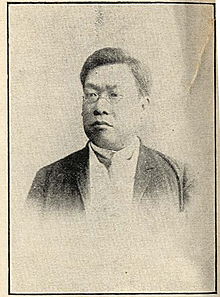Hoshi Tōru
Hoshi Tōru ( Japanese 星 亨 ; born May 19, 1850 in Edo (now Tokyo ); died June 21, 1901 ) was a Japanese politician during the Meiji period .
life and work
Hoshi Tōru worked as a lawyer in London from 1874 to 1877 after completing his law degree. Supported by Mutsu Munemitsu , he worked as a lawyer in the Ministry of Justice. In 1881 he joined the Jiyūtō party. There he played a leading role in advertising and fundraising activities. He was critical of the Meiji oligarchy's occupation of high office and was jailed for insulting government officials.
In 1887 he was banished from Tokyo due to the peace decree. In 1892 he was elected to the lower house of the Reichstag and became its spokesman, but soon afterwards he was removed from the list of parliamentarians for accepting bribes.
Hoshi was in close contact with Mutsu Munemitsu and then with Itō Hirobumi . He became ambassador to the United States in 1896, but when he heard of the formation of a coalition cabinet under Ōkuma Shigenobu and Itagaki Taisuke , he returned to Japan in 1898 without permission. In 1900 he helped found the Rikken Seiyūkai and in the same year became communications minister in the 4th Itō cabinet . He came under suspicion of corruption and had to resign that same year. Hoshi then took over the presidency of the Tokyo City Council. He was murdered by Iba Sōtarō (1851-1903), who accused him of corruption in the City Council.
Remarks
- ↑ The peace decree "保安 条例" (Hoan jōrei) forbade all political activities against the current law.
literature
- S. Noma (Ed.): Hoshi Tōru . In: Japan. An Illustrated Encyclopedia. Kodansha, 1993, ISBN 4-06-205938-X
- Hunter, Janet: Hoshi Tōru . In: Concise Dictionary of Modern Japanese History. Kodansha International, 1984. ISBN 4-7700-1193-8 .
Web links
| personal data | |
|---|---|
| SURNAME | Hoshi, Tōru |
| ALTERNATIVE NAMES | 星 亨 (Japanese) |
| BRIEF DESCRIPTION | Japanese politician |
| DATE OF BIRTH | May 19, 1850 |
| PLACE OF BIRTH | Edo |
| DATE OF DEATH | June 21, 1901 |

